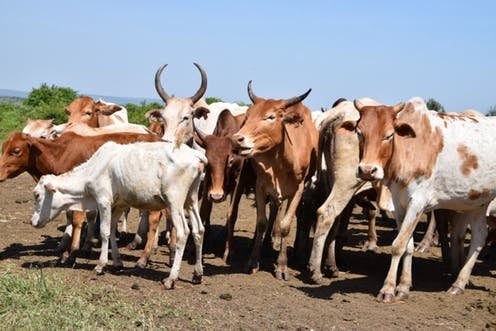You may have just read that the federal government strongly warns Nigerians against the consumption of hide (ponmo), smoked meat and bush meat due to the outbreak of anthrax disease in neighbouring countries.
While ponmo, smoked meat and bush meat may not be foreign to you, ‘anthrax disease’ might be.
Here are six things you should know about the disease.
What is anthrax disease?
Advertisement
According to the World Health Organisation (WHO), anthrax is an infection caused by the spore-forming bacteria called Bacillus anthracis that typically affects ruminants such as cows, sheep, and goats.
It is a zoonotic disease, which means it is transmissible from animals to humans.
How do animals get infected?
Advertisement
Animals can become infected with the disease when they breathe in or ingest spores in contaminated soil, plants, or water.
For instance, animal feed can be contaminated by anthrax if it contains bone meal of infected animals. If an animal eats the feed, it could become infected.
Insects can also transmit the bacterium between animals.
How do humans get infected?
Advertisement
If anthrax spores get into the body and become ‘activated’, the bacteria can multiply, spread out in the body, produce toxins, causing severe illness.
Anthrax spores can get into the body through different ways which are classified into four types of anthrax. The symptoms of the disease also depend on the mode of infection.
Cutaneous anthrax occurs when anthrax spores get into the skin, usually through a cut when a person handles infected animals or contaminated animal products like wool, hides, or hair. Symptoms include small blisters that itch, skin sore and swelling around the sore.
Inhalation anthrax— This occurs when a person inhales anthrax spores in places such as wool mills and slaughterhouses when working with infected animals or contaminated animal products.
Advertisement
Inhalation anthrax is considered to be the most deadly form of anthrax. Symptoms include fever, chest discomfort, cough, body aches, vomiting, headache and shortness of breath.
Gastrointestinal anthrax — this happens when a person eats raw or undercooked meat from an animal infected with anthrax. Symptoms include fever, painful swallowing, diarrhoea, swelling of the abdomen, sore throat, and stomach pain.
Advertisement
Injection anthrax — This newly discovered anthrax occurs when people inject themselves with contaminated heroin. The symptoms are similar to cutaneous anthrax but injection anthrax can spread throughout the body.
Is anthrax contagious in humans?
Advertisement
No, anthrax is not contagious and therefore cannot be caught from another person like the common cold or flu.
There is, however, a small risk in the case of cutaneous anthrax, where discharges from skin lesions may be infectious.
Advertisement
Can it be treated?
Anthrax can be treated with antibiotics, which need to be prescribed by a medical professional.
Also, humans potentially exposed to anthrax spores may be provided with prophylactic treatment. If left untreated, anthrax could lead to death.
Is there a vaccine for anthrax?
Yes, there are anthrax vaccines for animals and humans. But human vaccines are in limited supply and used primarily for protection of selected individuals possibly exposed due to their occupation.






